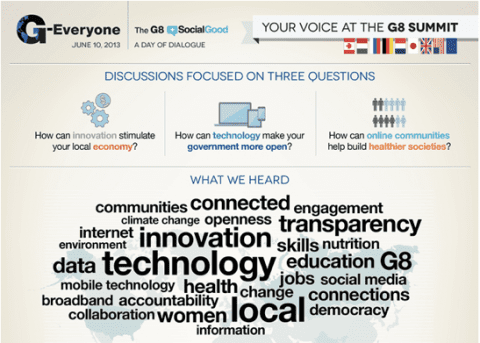The role of crowdsourcing in policy formulation
Updated on 05 April 2024
In his recent guest blog, Giulio Quaggiotto, UNDP argues that citizen engagement is more about design than technology.
This is particularly relevant for Diplo’s E-Participation day conference where we will discover how governments, international organisations and development agencies are using new media to engage and interact with beneficiaries and citizens.
It appears to me that the examples below incorporate some of the design principles that Giulio mentions.
The World We Want consultations have been organized to provide input for the report on post-2015 development goals. This web-based application allows users to display, explore and analyse outputs from both the survey and consultations.
The My World Survey, allows users to compare priorities by country, gender, age group or by human development index groupings. The authors claim that more than 560,000 citizens from 194 countries have now taken part in the survey.
From the World We Want site, users can explore consultations by topic and drill down to individual discussions. Content can be filtered to show comments received via forums, articles, voices, events and files.
A similar crowdsourcing consultation was launched by G-Everyone to identify urgent issues that need to be addressed at the G8 Summit. The debate was framed around three main topics:
- How can innovation stimulate your local economy?
- How can technology make your government more open?
- How can online communities help build healthier societies?
This leads us to the point of this blog. What is the role of crowdsourcing in policy formulation?
Does it represent an innovative and representative way of identifying citizen concerns? Or does it, as some critics claim, simply amplify the voice of the well-connected digerati?
We’d like to hear your views. Join us at Diplo’s E-Participation day on Wednesday, 19 June, in person, or online.

